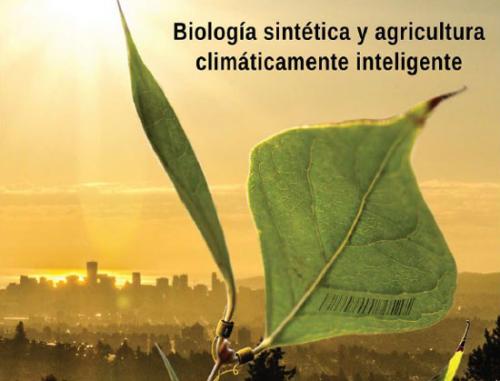Outsmarting Nature
- Opinión

Summary
Issue
Many of the world’s largest agro-industrial corporations have already sworn fealty to “Climate-Smart agriculture” (CSA) as part of the new Global Alliance for Climate-Smart Agriculture (GACSA) – and they’re preparing to march into Paris for the UN’s December Climate Conference (UNFCCC COP 21) waving the Climate-Smart flag. Although it’s currently below the radar, both public- and private-sector advocates of CSA are embracing tools of synthetic biology (“Syn Bio”) as the latest, greatest game-changing technology to combat climate change. If they get their way in Paris, industry will insist that synthetic biology’s made-from-scratch living organisms and designer crops are essential adaptation and mitigation strategies as the climate crisis deepens.
The world’s largest agrochemical and seed companies, public-sector researchers and biotech start-ups are actively incorporating synthetic biology in current R&D. This report briefly examines agriculturerelated R&D involving Syn Bio’s microorganisms and crops being developed in the name of climate-change mitigation and adaptation, including high-tech approaches to enhance photosynthesis (e.g., engineered pathways regulating nitrogen fixation and environmental stress tolerance). We examine one research team that seeks to activate drought tolerance in crops with proprietary chemicals; we also look at how synthetic biologists envision the use of controversial “gene drives” to engineer weeds in the wild to become more susceptible to pesticides.
Actors
The UN’s Food and Agriculture Organization (FAO) began talking about “Climate-Smart” agriculture in 2009 as a way to bring agriculture – and its role in mitigation, adaptation and food security – into the climate negotiations.2 Two FAO conferences dedicated to Climate-Smart agriculture, organized with the World Bank and a small group of governments, followed in 2010 and 2012. Formally launched as The Global Alliance for Climate-Smart Agriculture (GACSA) in 2014, its membership now includes 22 national governments, agribusiness lobby groups (the majority representing the fertilizer industry)3, the world’s largest network of public agricultural scientists – the Consultative Group on International Agricultural Research (CGIAR) – universities and NGOs. Climate-smart agriculture is also promoted by the World Business Council for Sustainable Development (WBCSD) through its Low Carbon Technology Partnerships Initiative (LCTPi), which aims to influence climate negotiations in Paris and beyond.
Policy
More than 350 civil society organizations from around the world (including social movements, peasant/farmers’ organizations and faith-based communities) are urging negotiators in Paris to reject the “Climate-Smart” brand of the Global Alliance. The coalition warns that CSA “does not involve any criteria to define what can or cannot be called ‘Climate Smart.’ Agribusiness corporations that promote synthetic fertilisers, industrial meat production and large-scale industrial agriculture – all of which are widely recognised as contributing to climate change and undermining the resilience of farming systems – can and do call themselves ‘Climate Smart.’”4 The immediate danger is that industry-led lobby efforts could result in climate negotiators explicitly endorsing Climate-Smart agriculture at COP 21 and steering the Convention’s Green Climate Fund resources toward specious Climate- Smart projects that distract from real solutions to build resilience. (The Green Climate Fund is a financing mechanism of the Convention to support developing country mitigation and adaptation projects – including agriculture.
* Documento completo en PDF
Del mismo autor
- Un movimiento de largo plazo por la alimentación 01/04/2021
- ¿UICN secuestrada por la industria de la biología sintética? 03/09/2020
- Tecno-fusiones comestibles 03/07/2020
- Tecno-fusiones comestibles: mapa del poder corporativo en la cadena alimentaria 30/01/2020
- Exterminadores en el campo 14/02/2019
- Más de 200 líderes y organizaciones globales por la alimentación rechazan los “impulsores genéticos” 22/10/2018
- La alimentación mundial: entre inversiones oscuras y datos masivos 17/10/2018
- Geoingeniería: El gran fraude climático 30/08/2018
- Bayer-Monsanto… Bits y Microbios 23/03/2018
- Reguladores de Europa ceden ante Bayer-Monsanto… 22/03/2018
Crisis Ambiental
- Paula Bianchi 07/04/2022
- Leonardo Boff 05/04/2022
- Gabriela Ramírez, OBELA 04/04/2022
- Gabriela Ramírez, OBELA 04/04/2022
- Aviva Chomsky 28/03/2022
Cambio Climático
- Leonardo Boff 15/02/2022
- Prabir Purkayastha 14/02/2022
- Prabir Purkayastha 13/02/2022
- Jake Johnson 09/02/2022
- Jomo Kwame Sundaram 26/01/2022
